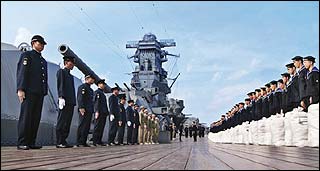|
Battleship film revives Japan's wartime pride
(telegraph.co.uk)
Updated: 2005-11-28 09:13
Sixty years after the colossal battleship Yamato was sunk, the pride of
Japan's wartime navy is once again an object of fascination.

The £3million
replica deck, made for the film Men of the Yamato, has attracted 400,000
Japanese visitors. |
Almost 400,000 visitors
have flocked to see a full-scale replica of the deck of the Yamato in Onomichi,
western Japan. The ship was reconstructed for the shooting of a film, Men of the
Yamato, which will be released next month.
The Yamato, the largest battleship ever built, was considered indestructible
by the Japanese. But little more than three years after it was completed it was
sunk in the East China Sea in April 1945 on a suicidal mission that cost the
lives of almost its entire crew of 3,000 men.
The film does not glorify the sacrifice, graphically portraying the anguish
of the crew's families and the bloody end to which the men came as their ship
was swarmed by US Navy planes.
But, like other recent Japanese war movies, it glosses over Tokyo's
aggression and focuses instead on the bravery and comradeship of the men who
fought.
Growing tension in East Asia, particularly since North Korea launched a
missile over Japanese airspace in 1998, has led to a rethink of the post-war
commitment to pacifism. As Japan's Self Defence Forces have been despatched to
provide logistical support for the US-led war in Afghanistan and to Iraq for
post-war reconstruction, it has become more acceptable to be interested in
military matters.
The true hero of the film is the Yamato itself. The production company Toei
spent £3 million building the replica deck to ensure the film gives a powerful
sense of the scale of the ship and the awe it inspired in the wartime nation.
The ship displaced 65,000 tons and was 862 feet long but was largely obsolete
by the time it was built. The Japanese attack on Pearl Harbour amply
demonstrated the vulnerability of battleships to aerial attack.
The anniversary of the ship's sinking was also marked in April by the opening
of a museum dedicated to the Yamato in Kure, near Hiroshima, where the original
was built. The museum displays items recovered from the Yamato after it was
located on the sea bed in 1985.
Under pressure to take a larger share of the burden of fighting in 1945, the
Japanese navy elected to turn the Yamato into a gigantic kamikaze ship. With
neither air cover nor enough fuel to return, the Yamato was ordered to sail to
Okinawa, where the Americans were fighting their way on to Japanese soil.
It was destroyed the day after setting sail, becoming the epitome of the
"smashed jewel", a rallying cry for the entire nation to achieve beauty in
defeat by dying without surrendering.
The Yamato continues to loom large in popular consciousness. One of the
country's most famous cartoon series is Spaceship Yamato, set in a future when
the Yamato is recovered from the sea and flown into space. Yamato model ships
are the must-have toy for boys.
The Yamato offers the Japanese a relatively safe outlet for feelings of pride
in - and sympathy for - the war generation. Few express admiration for the
wartime leaders or for soldiers who fought in China, for example, where
massacres were committed.
But the navy's reputation was not sullied by atrocities while its leader,
Admiral Isoroku Yamamoto, opposed the catastrophic war with the United States.
The young sailors of the Yamato are widely seen as victims, who fought
bravely to protect their country even as they were betrayed.
The film's director, Junya Sato, has stressed it is an anti-war film. "We
need to think about what needs to be done so that Japan doesn't go to war again.
Making a film about the Yamato is a step in that direction," he said.
However, others fear a negative reaction from a war movie which focuses only
on Japanese suffering.
"Given the strained relations with China I wonder whether this is a good time
to make this movie. It could be misunderstood as glorifying the ship and the
war," said one visitor to the reconstructed Yamato.
|